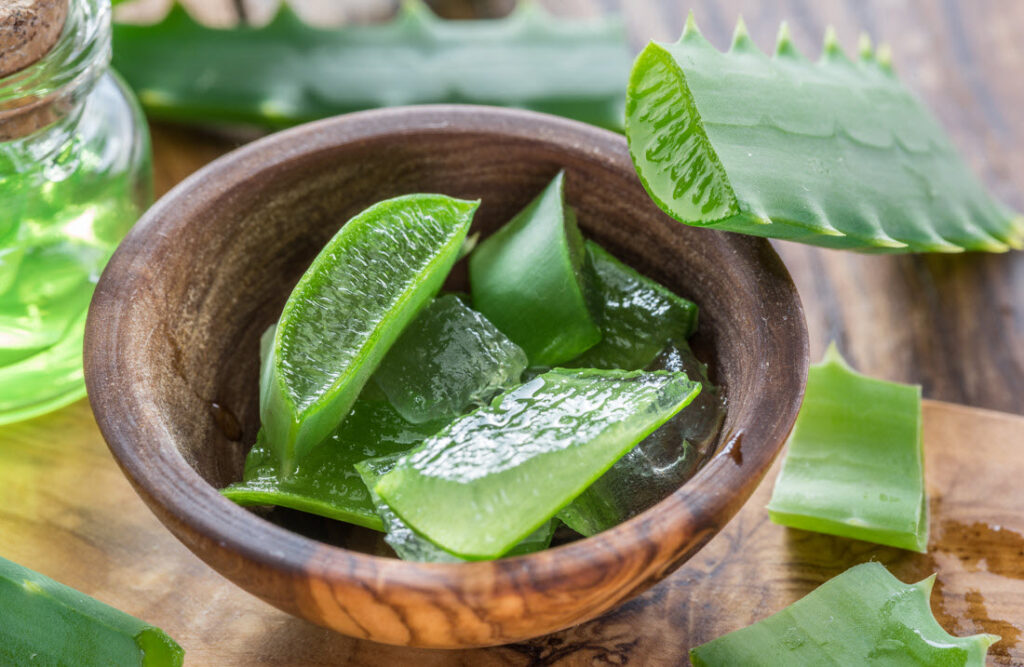Introduction
Aloe vera, often referred to as the “miracle plant,” has been a cornerstone of natural medicine for thousands of years. Known for its thick, fleshy leaves filled with a gel-like substance, Aloe vera is celebrated for its healing, soothing, and rejuvenating properties. This comprehensive guide explores the botanical details, health benefits, uses, and precautions of Aloe vera, making it a must-read for anyone interested in herbal remedies.
Botanical Profile
Latin Names
- L. Aloe vera
- Aloe barbadensis var. miller
- Aloe vera var. chinensis
- Aloe vulgaris
- Aloe vera var. lanzae
- Aloe indica
- Aloe barbadensis var. chinensis
- Aloe vera var. wratislaviensis
- Aloe elongata
- Aloe vera var. littoralis
- Aloe perfoliata var. vera
- Aloe perfoliata var. barbadensis
- Aloe flava
- Aloe chinensis
- Aloe barbadensis
- Aloe lanzae
Common Names
- Aloe vera
- True Aloe
Plant Family
- Asphodelaceae (Liliaceae family)
Description
Aloe vera is a succulent plant species with thick, green, fleshy leaves that store water. The leaves contain a clear gel rich in bioactive compounds, which is widely used for medicinal and cosmetic purposes. The plant thrives in arid climates and is cultivated globally for its therapeutic properties.

Chemical Composition
Aloe vera contains over 200 active compounds, including:
- Vitamins: A, C, E, and B12 (trace amounts)
- Minerals: Calcium, magnesium, zinc, and germanium
- Enzymes: Aid digestion and skin repair
- Amino acids: Building blocks of proteins
- Anthraquinones: Natural laxatives
- Saponins: Cleansing and antiseptic properties
- Fatty acids: Anti-inflammatory effects
Health Benefits of Aloe Vera
- Skin Health
- Soothes sunburn, minor burns, and cuts.
- Moisturizes and rejuvenates the skin.
- Reduces acne and inflammation.
- Digestive Health
- Acts as a natural laxative for constipation relief.
- Soothes ulcers, heartburn, and irritable bowel syndrome (IBS).
- Cleanses the stomach, liver, and colon.
- Immune Support
- Boosts white blood cell production.
- Enhances the body’s ability to fight infections and diseases.
- Anti-Inflammatory Properties
- Reduces inflammation in arthritis and joint pain.
- Soothes internal tissues, such as the digestive tract and lungs.
- Hair Care
- Promotes healthy hair growth.
- Reduces dandruff and scalp irritation.
- Stress and Sleep Management
- Supports adrenal gland function to combat stress.
- Promotes relaxation and improves sleep quality.
- Oral Health
- Reduces plaque and gingivitis.
- Soothes mouth ulcers and gum inflammation.
How to Use Aloe Vera
- Topical Application
- Apply fresh Aloe vera gel directly to the skin for burns, cuts, or moisturizing.
- Use in DIY face masks, hair masks, or as a natural styling gel.
- Internal Consumption
- Drink Aloe vera juice (2-4 oz daily) for digestive and immune health.
- Add Aloe vera gel to smoothies or juices.
- Oral Hygiene
- Use Aloe vera-based toothpaste or mouthwash for gum health.
Scientific Research on Aloe Vera
- A 1997 study by Dr. Jeremiah Herlihy found that daily Aloe vera consumption reduced leukemia, heart disease, and kidney disease in test animals, extending their lifespan by 25%.
- Research suggests Aloe vera may reduce inflammation in arthritic joints and improve asthma symptoms.
- Studies indicate its potential to boost immunity, combat HIV, and support cancer treatment by reducing chemotherapy side effects.
- Over 200 scientific papers have explored its anti-inflammatory, anti-bacterial, and anti-viral properties.
Precautions and Side Effects
While Aloe vera is generally safe, it’s essential to use it responsibly:
- Allergic reactions: Perform a patch test before topical use.
- Oral consumption: Excessive intake may cause cramps or diarrhea.
- Drug interactions: Avoid overuse with oral corticosteroids to prevent potassium deficiency.
- Laxative compounds: Ensure products are free from aloe latex to avoid digestive discomfort.
Conclusion
Aloe vera is a versatile and powerful herbal remedy with a wide range of applications. From skincare and digestive health to immune support and stress management, this “miracle plant” offers countless benefits. Whether used topically or consumed internally, Aloe vera is a natural solution for enhancing overall health and well-being. Always consult a healthcare professional before incorporating Aloe vera into your routine, especially if you have underlying health conditions or are taking medications.
- Aloe vera benefits
- Aloe vera uses
- Aloe vera for skin
- Aloe vera juice
- Herbal remedies
- Natural healing plants
- Aloe vera for digestion
- Aloe vera for hair
- Aloe vera research
- Aloe vera side effects